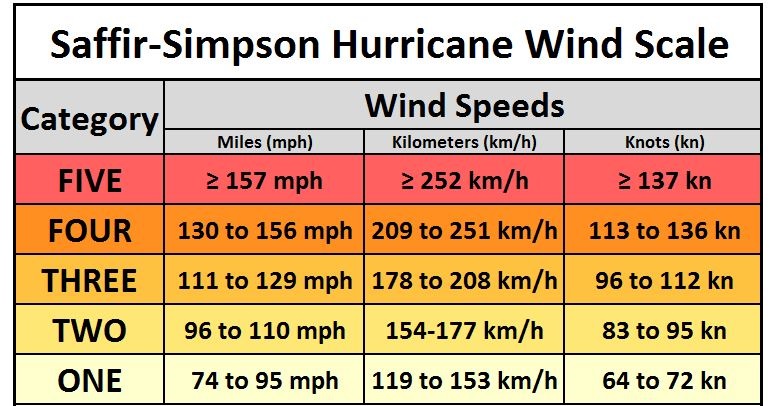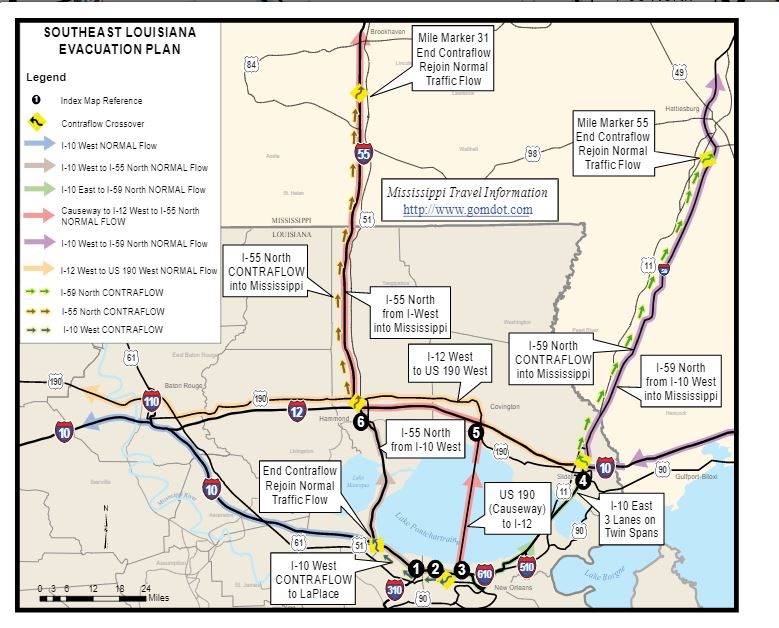Hurricanes
Hurricane Season is June 1 through November 30, with peak season in September


Before the Storm
Prepare a personal evacuation plan.
- Identify ahead of time where you could go if you are told to evacuate.
- Keep handy the telephone numbers of these places as well as a road map of your locality. You may need to take alternative or unfamiliar routes if major roads are closed.
- Listen to Parish officials for evacuation instructions. Make sure everyone in your household knows and understands your hurricane evacuation plan.
St. John Parish Assisted Evacuation Plan - Mandatory Evacuation Only
Map of Contraflow Plan

Stock an Emergency Supply Kit.
Protect Your Valuables
- Move objects that may get damaged by wind or water to safer areas of your home. Move television sets, computers, stereo and electronic equipment, and easily moveable appliances like a microwave oven to higher levels of your home and away from windows. Wrap them in sheets, blankets, or burlap.
- Make a visual or written record of all of your household possessions. Record model and serial numbers. This list could help you prove the value of what you owned if those possessions are damaged or destroyed and can assist you to claim deductions on taxes. Store a copy of the record somewhere away from home, such as in a safe deposit box.
Strengthen Your Home
- Bring things that could become flying hazards indoors. Lawn furniture, trash cans, children's toys, garden equipment, clotheslines, hanging plants, and any other objects that may fly around and damage property should be brought indoors.
- Consider covering the outside of windows with shutters or plywood. Use shutters that are rated to provide significant protection from windblown debris, or fit plywood coverings over all windows.
Plan for Special Needs
- Individuals with special needs should call the Health and Human Services Office at 985-536-4955 to register for assistance during an evacuation.
Plan for Pets
- Plan to bring food and water, a manual can opener, leashes, pet carriers, vet records and current identification when traveling.
- If a mandatory evacuation is called, please bring pets to a St. John Parish pick up point to be transported to the proper shelter.
Stay Informed
- Register for Parish Weather Alerts by texting SJPWEATHER to 888-777.
- Pay attention to emergency information and alerts.
- Download Weather Apps to your smartphone.
- Buy a weather radio in case of power outage or cell service outage.
- Follow St. John Parish on the Government Access Channel (15/99), Facebook, Instagram, Twitter, and website at sjbparish.gov.
During a Hurricane – Staying Home
- Determine how best to protect yourself from high winds and flooding.
- Take refuge in an interior room for high winds.
- If trapped in a building by flooding, go to the highest level of the building. Do not climb into a closed attic. You may become trapped by rising flood water.
- Do not walk, swim, or drive through flood waters. Turn Around. Don’t Drown! Just six inches of fast-moving water can knock you down, and one foot of moving water can sweep your vehicle away.
- Report power outages to Entergy at 1-800-9OUTAGE.
Returning Home After a Hurricane
- Pay attention to local officials for information and special instructions on when to return home.
- Be careful during clean-up. Wear protective clothing and use appropriate face coverings or masks if cleaning mold or other debris.
- Do not touch electrical equipment if it is wet or if you are standing in water. If it is safe to do so, turn off electricity at the main breaker or fuse box to prevent electric shock. Stay away from loose dangling power lines.
- Do not wade in flood water, which can contain dangerous pathogens that cause illnesses, debris, chemicals, waste, and wildlife. Underground or downed power lines can also electrically charge the water.
- Save phone calls for emergencies if possible. Phone systems are often down or busy after a disaster. Use text messages or social media to communicate with family and friends.
- Document any property damage with photographs. Contact your insurance company for assistance.
- Know that it is normal to feel anxious or stressed. Take care of your body and talk to someone if you are feeling upset.
Debris Management During a Disaster

Business Resources
Louisiana Small Business Development Center
Emergency Numbers
- Emergency Preparedness - 985-652-2222
- Power Outage - 1-800-9OUTAGE
- Atmos Energy - 1-888-286-6700
- St. John Sheriff’s Office – 985-652-9513
- LA Info & Referral Service – 211
- Road Closures – 511
- To report flooding or other emergencies - 911
Additional Resources